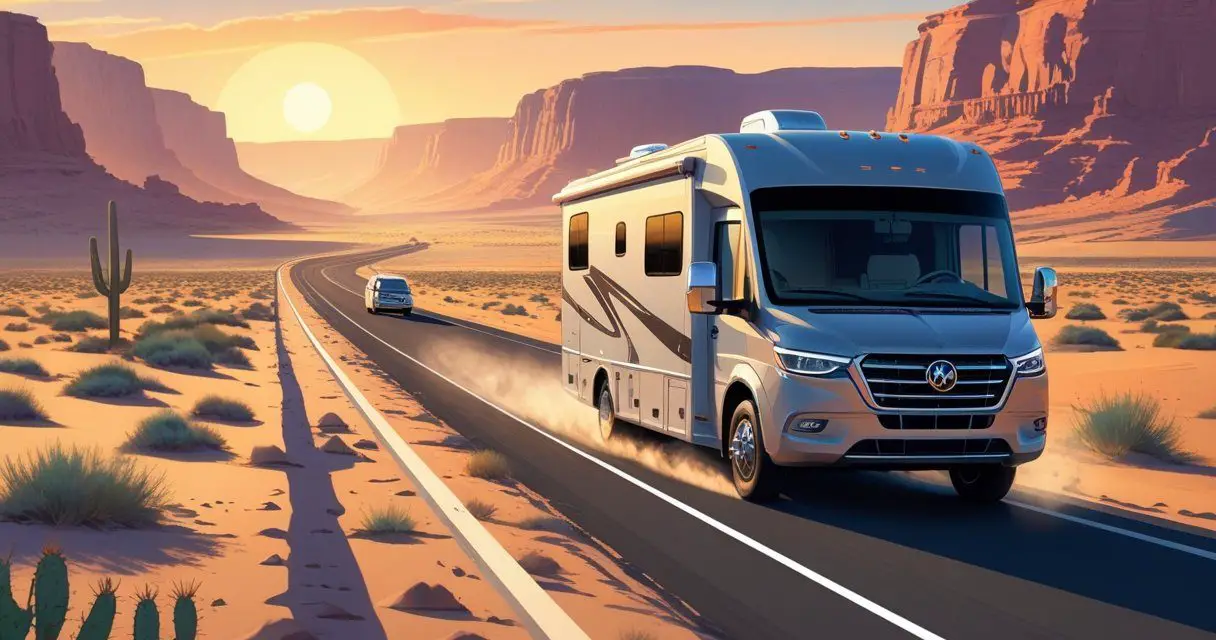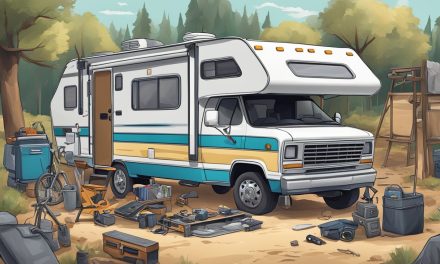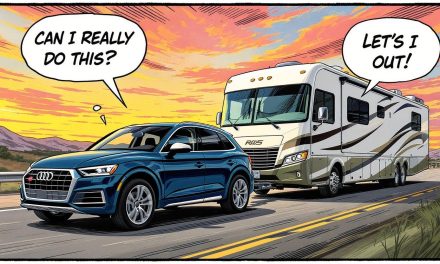You’ve watched the Instagram posts and dreamed of the open road, but cross-country RV travel isn’t all campfires and sunset photos. Real RV life involves low bridge warnings, broken water pumps, and the constant fear that your slide-out might fall off in a Walmart parking lot. With over 45 million Americans planning to hit the road in RVs this year, you’re definitely not alone in this adventure.
The truth is, successful RV travel requires more than just pointing your rig toward the horizon and hoping for the best. Whether you’re a weekend warrior or planning the trip of a lifetime, these seven survival tips will help you cross the country without losing your mind, your money, or your relationship. These aren’t just suggestions – they’re hard-earned wisdom from RVers who’ve learned the hard way.
Would you like to save this article?
1. Plan Like Your Life Depends on It (Because It Might)
You can’t just type “Grand Canyon” into Google Maps and hit the road like you’re driving a convertible. You’re dragging a house down the highway at 65 mph with nothing but a tailwind and a prayer. Research everything: steep grades, propane restrictions, bridge clearances, and roads that should be goat paths but somehow get four stars on Trip Advisor.
Download every RV app like you’re studying for a NASA exam. RV Trip Wizard, Campendium, GasBuddy, AllStays – get them all. According to the Recreation Vehicle Industry Association, proper planning can reduce travel incidents by up to 40%.
| Essential Planning Apps | What They Do |
|---|---|
| RV Trip Wizard | Route planning with RV-specific restrictions |
| Campendium | Campground reviews and photos |
| GasBuddy | Find cheapest fuel stops |
| AllStays | Locate RV-friendly services |
Your Reality Check: You think you’re being spontaneous by skipping the planning phase, but you’ll quickly discover that “adventure” can easily turn into “breaking news story about couple stranded on mountain pass while semi trucks honk and the dog throws up from altitude sickness.”
2. Book Campsites Like Karen at the KOA Is Your Boss
Think you’re clever rolling into Yellowstone without a reservation in the middle of July? You’ll find yourself circling like vultures with 37 other RVers while Karen behind the counter cheerfully informs you she’s been booked solid for nine months.
Research shows that 50% of national park campsite reservations are made more than one week in advance, with popular destinations booking up within hours of their 6-month booking window opening. The competition is real, and your free spirit won’t impress anyone when you’re sleeping in a Waffle House parking lot at 3 AM.
The booking statistics are brutal:
- National parks: Book 6 months in advance
- State parks: 3-4 months ahead for peak season
- Private campgrounds: 2-3 months for prime spots
Your Reality Check: You believe in going with the flow until you realize the only thing flowing is the line of disappointed RVers driving away from fully booked campgrounds. Book ahead, especially during summer, and especially if you prefer sleeping somewhere other than behind a gas station.
3. Master State Laws Before They Master You
Every state has different RV laws, and they can’t agree on anything. Some states allow overnight RV parking; others will slap you with a $500 fine and tow your rig faster than you can say “I was just napping.” Generator hours vary wildly – some places cut you off at 10 PM, others at 6 PM, and Brenda’s already racing over on her golf cart with a citation ready.
Key law variations by state:
- Propane restrictions: Some states won’t let you through tunnels with propane tanks
- Speed limits: RV towing speeds range from 55-75 mph depending on state
- Overnight parking: Legal in some states, $500+ fine in others
- Generator hours: Varies from 6 PM to 10 PM cutoffs
Your Reality Check: You assume that America has consistent laws until you’re explaining to a very tired police officer why you thought it was perfectly acceptable to dump your grey water behind a Chili’s in South Dakota. Do your homework, or prepare for some expensive education.
4. Budget Like You’re Sponsoring a NASCAR Team
Some people think RVing is cheap – that’s adorable. Let’s break down the brutal math: gas costs $200+ per day if you’re lucky, and you’ll start talking to fuel pumps like a hostage negotiator. Campsite fees run $50-100+ per night unless you’re boondocking with coyotes.
The average cross-country RV trip costs:
- Fuel: $3,000-5,000 for 2-week trip
- Campsites: $1,400-2,800 (2 weeks)
- Food: $800-1,200 (you’ll eat out more than planned)
- Unexpected repairs: $500-2,000 (something WILL break)
Don’t forget food costs – you think you’ll cook, but you’ll stop at every roadside diner advertising “the best pie in the Midwest.” Budget like you’re planning a small wedding, except instead of a honeymoon, you get an oil change and the privilege of spending $30 on firewood that burns in 12 minutes.
Your Reality Check: You thought RV travel would save money compared to hotels until you realize you’re basically driving a gas-guzzling house that requires constant feeding and occasional expensive medical attention. Have a financial cushion ready – you’ll need it.
5. Take Breaks Before Your Spine Turns Into a Question Mark
People think RV travel is relaxing when it’s actually sitting in a chair for 6 hours getting violently shaken around. The famous 3-3-3 rule exists for a reason: 300 miles a day, arrive by 3 PM, stay for three nights. Will you follow it? Absolutely not, but it’s inspirational like flossing or not fighting over the thermostat.
According to RV safety statistics:
- Driver fatigue accounts for 25% of RV accidents
- The 3-3-3 rule reduces stress-related incidents by 60%
- Regular breaks every 2 hours improve alertness by 40%
Stop, stretch, pee, and breathe. Otherwise, your spine will slowly morph into a question mark, plus you’ll need those stops so your spouse can silently mutter “I hate this” out the window. You’ll arrive happier, less angry, and less likely to throw camping chairs into the woods when you can’t back into your site.
Your Reality Check: You believe you can power through 8-hour driving days like you’re in a regular car until you discover that piloting a house down the highway requires the stamina of a marathon runner and the patience of a saint. Take breaks, or arrive looking like you’ve been through a blender.
6. Prioritize Safety Like Your Life Depends on It
Nothing screams vacation like an electrical fire. You’d be surprised how many people spend $70,000 on a rig and then forget about tire pressure. Some folks are towing 8,000 pounds of emotional baggage and propane without even owning a torque wrench.
Essential safety statistics:
- RVs have a fatality rate of 0.44 deaths per 100 million vehicle miles (vs. 1.48 for all vehicles)
- Tire-related incidents cause 30% of RV breakdowns
- 90% of RV fires are preventable with proper maintenance
| Safety Checklist | Why It Matters |
|---|---|
| Tire pressure | Prevents blowouts and poor handling |
| Brake inspection | Essential for stopping heavy loads |
| Fire extinguisher | Must be current and accessible |
| CO/Smoke detectors | Check batteries regularly |
| Propane system | Secure tanks, check for leaks |
Your Reality Check: You spent more on this RV than most people spend on cars, but somehow you think basic safety maintenance is optional. That propane tank isn’t a suggestion – it’s basically a bomb strapped to your bumper. Treat it with the respect it deserves before it treats you to an unwanted fireworks show.
7. Stay Flexible Because Your Plans Mean Nothing to the RV Gods
Road trips never go as planned. You’ll have days where your tires give up, your destination is closed due to a “bear encounter,” or your perfectly planned route gets detoured through towns that look like they specialize in questionable life choices. Flexibility isn’t optional – it’s a survival trait.
Real RV travel statistics:
- 68% of RV trips involve at least one major detour
- 42% of RVers report significant itinerary changes
- Most successful RV travelers plan for 25% more time than expected
You’ll encounter permanently closed gas stations, double-booked campsites, and detours that seem designed by someone who clearly hates RVers. Roll with it and laugh, because if you don’t laugh, you’ll cry – and crying at a truck stop Arby’s just hits different.
Your Reality Check: You made detailed plans with military precision until reality reminded you that you’re basically homeless people with really expensive transportation. Embrace the chaos, laugh at the disasters, and remember that the best stories come from the worst plans.
Final Thoughts
At some point during your cross-country adventure, you need to look around – at the campfire, the stars, even your dog who hasn’t stopped panting since Iowa – and realize you’re actually doing it. You left the spreadsheets behind and you’re living in a glorified tin can, somehow managing not to burn your toast this morning.
RV life isn’t about the perfect Instagram photo. It’s about the journey, the mishaps, and the stories you’ll tell for years. Yes, it’s challenging, expensive, and occasionally maddening, but with proper planning, realistic budgeting, and a sense of humor, you might just have the time of your life.
Remember: Book those campsites, plan that route, and for the love of all that’s holy, don’t trust your GPS through downtown Philadelphia.
SOURCES
- The Camping Loop – Top 7 RV Tips You Need To Know BEFORE You Travel Across Country
- RV Industry Association – 2024 Quarterly Travel Intention Survey
- Camper Champ – Camping Statistics 2024
- Emergency Assistance Plus – RV Statistics for 2025
- Recreation.gov – National Park Reservation System
- Resources for the Future – Nature-Based Recreation: Understanding Campsite Reservations
- NCBI – Exclusionary Effects of Campsite Allocation through Reservations
- RV Share – RV Travel Trends 2024







